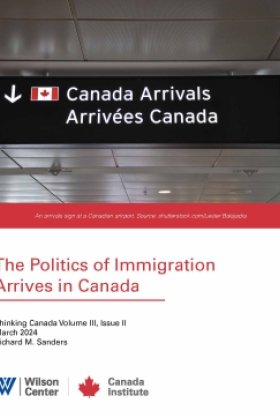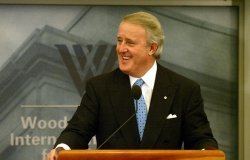The Experiences of Civil Rights Lawyers in the 1950s and 1960s
Overview
Berl Bernhard, former staff director, U.S. Commission on Civil Rights (1959-1963) and former counsel, Lawyers Committee for Civil Rights (1968-1969); William Taylor, former staff director, U.S. Commission on Civil Rights (1965-1968) and current vice chairman of the Leadership Conference on Civil Rights; Harris Wofford, former legal assistant, U.S. Commission on Civil Rights (1954-1958), special assistant to President John F. Kennedy on civil rights (1960-1962) and former U.S. Senator (1991-1995); moderator Patricia Sullivan, associate professor of history and African American Studies, University of South Carolina and former Wilson Center Fellow.
When Berl Bernhard, William Taylor and Harris Wofford graduated from Yale Law School in June 1954, Brown v. Board of Education was only one month old and most young white Northerners were barely aware of the depth of racism in the United States. It was therefore logical for Prof. Patricia Sullivan to begin the Division of U.S. Studies' program that examined the experiences of white attorneys in the civil rights movement by asking the three men why they almost immediately became involved in the movement.
William Taylor was born in Brooklyn in 1931 and, an early Dodgers fan, watched Jackie Robinson being discriminated against as he traveled around the country with the team. Taylor felt that the Holocaust and his own experience of growing up Jewish at a time of anti-Semitism in the U.S. gave him particular empathy for Robinson and other African Americans. He went to work for the NAACP Legal Defense and Education Fund as soon as he graduated. Harris Wofford, who traveled to India after college and became a fan of Gandhi and non-violence, recalled being asked by Indians what was being done about segregation in the United States. He was motivated to begin studying law at Howard Law School, transferring to Yale after his first year. Berl Bernhard was outraged during his college years when his fraternity admitted a black student but was told by the national organization that the student could not become a member. Bernhard wrote his senior thesis on Supreme Court Justice John Marshall Harlan who, dissenting from the holding in Plessy v. Ferguson (1896) that segregation was constitutional, wrote, "Our constitution is color-blind...In respect of civil rights, all citizens are equal before the law and neither knows nor tolerates classes among citizens."
The three men, who have spent much of their careers in Washington, reminded the audience what the city was like in the late 1950s. The police force was entirely white; so was the FBI. Washington was governed by a group of commissioners, all of them white. Taxicabs refused to pick up black passengers, and there were no black bus drivers. African Americans had to sit in the balconies of the local movie theatres. At the end of Wofford's year at Howard (summer 1961), he and his fellow law students began picketing the Hecht Department Store's basement cafeteria, protesting the cafeteria's refusal to serve African Americans. It took six months for the store to give in and integrate.
The panelists emphasized that although everyone in the civil rights movement shared its goals (to end segregation and secure the vote for African Americans), the movement was in fact a conglomeration of methodologies and egos as well as the site of ferocious competition for limited funds by groups such as the NAACP, the Southern Christian Leadership Conference, and the Student Nonviolent Coordinating Committee. Thurgood Marshall, who initially thought that Brown v. Board would end segregation, was impatient with the "messiness" of Martin Luther King's demonstrations, and many of the demonstrating groups were equally impatient with the slow-moving legal and political processes.
Discussing the administrations of John F. Kennedy and Lyndon B. Johnson, the panelists stressed the disconnect between the perspective from Washington and what was happening in the ground. Bernhard mentioned the Justice Department's and the White House's disbelief that the South was as dangerous for the civil rights activists as people such as Bernhard reported. Wofford recalled suggesting to Kennedy, before he took office, that one of his first acts should be to sign the executive order prohibiting discrimination in federally assisted housing that President Eisenhower had on his desk but was ignoring. Once in office, Kennedy kept stalling, fearful of the political consequences for a president who had been elected by a very small margin. The defining moment for Kennedy and civil rights, according to Taylor, was the violence that accompanied James Meredith's attempt to enter the University of Mississippi in September, 1962. That, Taylor said, was when Kennedy realized he had to "fish or cut bait."
The panelists disagreed about the extent of various administration officials' understanding of and commitment to the cause of civil rights. Taylor questioned President Kennedy's commitment, but Wofford commented that timing is all and the American political process had to take its course. Had Kennedy tried to move faster on civil rights and to push a civil rights bill early in his administration, Wofford argued, he would have failed. The panelists agreed, however, that Robert Kennedy's perception of the cause underwent a major transformation, and that he was thoroughly in accord with it by the time he was assassinated. Bernhard, who conducted oral histories with African-American leaders such as Thurgood Marshall, Martin Luther King and Roy Wilkins, reported that they all believed that Lyndon Johnson was both committed to the cause and capable of taking the necessary action. Wofford added that had it not been for the quagmire of Vietnam, Johnson would have gone down in history as the great civil rights president.
Asked about the unfinished business of the movement, Taylor pointed to the growing gap between haves and have nots in the United States and the current shredding of the economic safety net. This, he declared, is not entirely about the racial gap but has everything to do with its continuation. Wofford agreed, noting that towards the end of his life Dr. King emphasized both the intersection of poverty and race and the importance of education. Bernhard commented that in retrospect, it was relatively easy to knock down the legal barriers to equality. What has proved harder is to formulate answers for the complicated problems posed by the nation's inner cities. Education, health care, jobs: all are implicated, and it is difficult to know where or how to begin. No, Taylor disagreed; the solutions are fairly obvious. What may be lacking, however, is the national will to implement them.
Philippa Strum, Director, Division of United States Studies 202-691-4147
Thank you for your interest in this event. Please send any feedback or questions to our Events staff.










